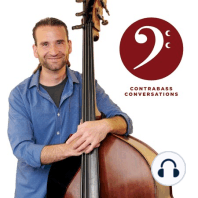11 min listen
22: François Rabbath Interview part 2
ratings:
Length:
41 minutes
Released:
May 27, 2007
Format:
Podcast episode
Description
Born in Aleppo, Syria into a musical family of six boys and three girls, François discovered the double bass at the age of thirteen when one of his brothers brought an instrument home and allowed him to experiment with it. When the family moved to Beirut, Lebanon he found an old copy of Edouard Nanny's Contrabass Method in a tailor shop and with some difficulty, since he read neither music nor French, began to teach himself. After nine years of work in Beirut, François saved enough money to move to Paris for a year. He was eager to go to the Paris Conservatory, meet with Monsieur Nanny and show him what he was able to do with the bass. When he applied at the Conservatory he was disappointed to learn that Nanny had died in 1947. He was also told that auditions were to be held in three days and that he would never have enough time to learn the required pieces. He asked for the music anyway and returned three days later to finish first among the applicants. However, his stay at the Conservatory was a brief one, since it didn't take very long to see that he was not only far ahead of the other students but of the professors as well! François Rabbath's uniqueness stems from his refusal to accept any traditional limitations. Whether performing his own fascinating compositions, the music of others or the classical repertoire, one is always moved by his profound musicianship and dazzling virtuosity. You quickly discover that he brings you such a sense of security that the most difficult passages sound effortless. The importance of François Rabbath to the development of double bass playing can be compared with that of Paganini to the violin. Since the early 1800s when Nicole Paganini established the violin as a virtuoso instrument, solo violinists have practiced the most brilliant of instrumental art. Meanwhile, the development of double bass playing had been seriously neglected. The great and popular 19th century composers did not consider the bass worth their attention and in turn the bass repertoire did not attract potential virtuoso performers with enough genius to change the situation. It demanded an artist with the unique qualities of François Rabbath to break this impasse. http://www.liben.com/FRBio.html Musical Guest - Leon Bosch You will be hearing the Bottesini Elegy and the Bottesini Gavotta from Leon Bosch’s recent solo album called Virtuoso Double Bass, which is available from Meridian Records. Leon’s website: http://www.leonbosch.co.uk Album information for Virtuoso Double Bass: http://www.leonbosch.co.uk/music.php Click here to order this great album from Leon Bosch: http://www.meridian-records.co.uk/acatalog/CDE84544a.html Meridian Records website: http://www.meridian-records.co.uk/ About Leon Bosch: (Visit his website for more information about this great artist’s career and the challenges he had to overcome during his early years in Apartheid South Africa.) From liner notes to his recent release as well as an interview with Lawrence Milner – published in the Summer 2003 edition of Double Bassist magazine: Leon had to overcome many difficult circumstances in the early years of his career. He was arrested by members of the Cape Town special branch when he was just 15 years old for demonstrating against the Apartheid government outside of parliament. He faced a month’s detention and torture, only to be found not guilty on all charges. This experience fired up his ambition to become a lawyer, but this field of study was forbidden to him by the regime at the time. He then chose to study a subject that would be the least likely to mark him out as subversive—music. Had Bosch been able to pursue his prime aspiration to become a lawyer, the cello/double bass debate might never have occurred. Born in Cape Town, South Africa in 1961, Bosch was forbidden by the repressive regime of the time to study law, so applied to the University's music faculty instead `as a light-hearted prank.' The `prank' soon turned more se
Released:
May 27, 2007
Format:
Podcast episode
Titles in the series (100)
1: Welcome to the Show!: life on the low end of the spectrum with Jason Heath by Contrabass Conversations
